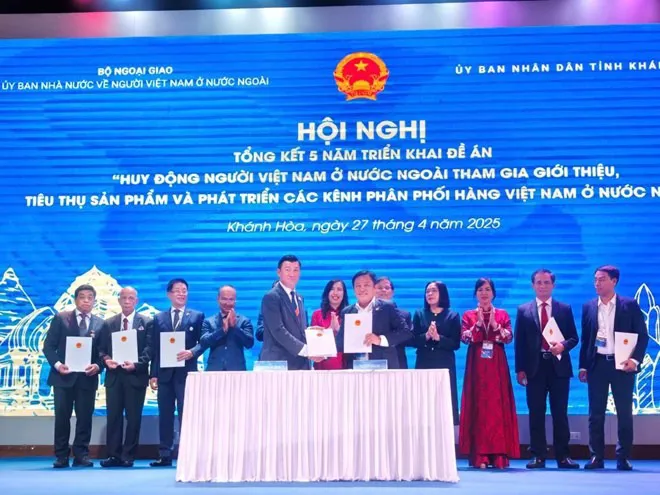Vietnam strengthens overseas sales channels to boost exports
Vietnam is expanding overseas distribution networks by connecting with diaspora entrepreneurs and negotiating trade deals, aiming to boost exports and elevate Vietnamese brands internationally.
The government should set up a support fund for overseas Vietnamese businesses, build a global trade information portal, and expand the role of diplomatic missions for such goals, said Nguyen Hong Hue, President of the Business Association of Overseas Vietnamese.
Hue made her proposal at the five-year review conference of Project 1797, titled “Mobilizing overseas Vietnamese to introduce and consume Vietnamese products and develop distribution channels for Vietnamese goods abroad,” held on April 27 in the southern province of Khanh Hoa.

Signing ceremony of memorandums of understanding between overseas Vietnamese and local partners. Photo: State Committee for Overseas Vietnamese Affairs
The ideas aim to address persistent challenges such as limited financial resources, weak interagency coordination, lack of reliable market data and partners, and uneven product quality and competitiveness across sectors.
Echoing these concerns, Ho Van Lam, President of the Thailand-Vietnam Business Association, called for Vietnam to intensify bilateral and multilateral trade negotiations with potential markets. By lifting technical barriers and protectionist policies, Vietnam could increase formal exports to Thailand.
Lam also pointed out the need to promote Vietnamese goods in provinces with large Vietnamese communities while connecting large and reputable exporters in Vietnam with Vietnamese entrepreneurs overseas for deeper cooperation.
Delegates at the conference agreed that stronger ties between local governments, domestic enterprises, industry associations, and overseas Vietnamese businesses will be crucial to diversifying markets and expanding distribution channels.
The conference reviewed the success of Project 1797 over the 2019-2024 period in driving Vietnam's economic development and trade through exports, while enhancing the global reputation of Vietnamese brands and showcasing the country's soft power.
When the project was launched in 2019, Vietnam's total import-export turnover amounted to more than US$516 billion, but by the end of 2024, the figure had surged to over US$786 billion. Project 1797 has been important in increasing Vietnamese goods in international markets.
Speaking at the event, Deputy Minister of Foreign Affairs Le Thi Thu Hang said that the implementation of Project 1797 coincided with a period of unprecedented challenges, including the Covid-19 pandemic, armed conflicts, supply chain disruptions, and global energy and food security crises.
"Despite these obstacles, Vietnam has remained a typical economic growth model," she said.
Nguyen Trung Kien, Chairman of the State Committee for Overseas Vietnamese Affairs under the Ministry of Foreign Affairs, said that through the strong network of overseas Vietnamese, Vietnamese goods have been distributed through diaspora channels and have been available in supermarkets, distribution chains, and major e-commerce platforms abroad.
These efforts have helped boost export turnover, reduce dependence on traditional partners, stimulate domestic production, and directly contribute to Vietnam's GDP growth, he noted.
The conference marked the signing of six memoranda of understanding between government agencies, local authorities, domestic enterprises, and overseas Vietnamese entrepreneurs to expand international distribution networks.
| Currently, there are more than six million overseas Vietnamese living, working, and studying in 130 countries and territories. |








